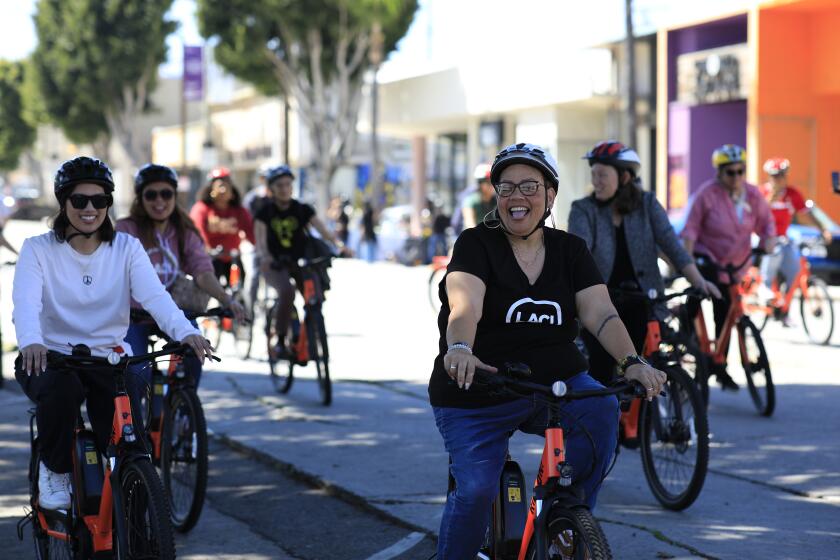Marchers demand more say in Metro projects
More than 200 protesters marched through Union Station on Thursday afternoon, banging drums as they passed train platforms, loudly demanding more community say in how the region’s transit agency manages and develops property along its rapidly expanding rail network.
The demonstration, which did not affect transit services, was held as the Metropolitan Transportation Authority continues its plan to aggressively pursue several new rail lines in various areas of Los Angeles County, as well as housing and other developments around them.
Speaking at the rally, Sunyoung Yang of the Bus Riders Union said Boyle Heights has been particularly affected by Metro development. “Over the years there has been a net loss in affordable housing,” she said. “People have been displaced.”
Metro officials said 110 units of Boyle Heights affordable housing removed to make way for two transit projects were replaced and that developing low-cost housing around transit lines is a top priority.
“Metro is a major player in terms of delivering affordable housing
He pointed to a recently completed development near a Red Line subway station in Westlake. It currently includes 90 units of affordable housing. Another pending project in Boyle Heights, at East 1st and North Lorena streets, will have up to 52 affordable units and 10,000 feet of retail space, he said.
Still, protesters, whose march wound from a park near Union Station to Metro headquarters and then on to Boyle Heights, accused Metro of seeking to bring big-box chain stores into neighborhoods, a change they contend pushes out local merchants.
Roger Moliere, chief of property development for Metro, said the agency is not likely to partner with big-box stores because they don’t fit with his agency’s mission of transit-oriented development, partly because those types of stores rely more on customers arriving by car.
Isela Gracian of the East LA Community Corp., a nonprofit whose focus includes affordable housing and economic development, said Metro needs to involve residents more in its development plans “from the very outset.” Metro meetings with residents can be unproductive because the language used by transit officials is too technical, among other reasons, she said.
--
More to Read
Start your day right
Sign up for Essential California for news, features and recommendations from the L.A. Times and beyond in your inbox six days a week.
You may occasionally receive promotional content from the Los Angeles Times.






